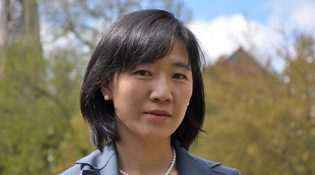 loading
loading
From the EditorThinking is harder than we thinkWoo-Kyoung Ahn’s popular class on thinking looks at ways we go astray.  Woo-Kyoung Ahn teaches “Thinking,” the semester’s most popular undergraduate course. View full imageThe Yale Law School auditorium can accommodate about 450 people. On the day I visited Woo-Kyoung Ahn’s twice-weekly class on Thinking, I had the rare experience of watching almost 449 undergraduates come in and sit down, on time, for a lecture course. We were five weeks into the semester; shouldn’t attendance have been sagging? From where I was sitting, far in the back, I could see dozens of open laptops, and I looked around to see how many were running YouTube videos. But except for some notetaking, every single screen displayed Ahn’s own materials for that day’s talk. How does she do it? Ahn told me she bases 30 percent of the students’ grades on quizzes they take at the end of each lecture. I assumed this was a psychology professor’s way of requiring students to step up for the job of learning. But Ahn corrected me: she gives the tests, she explained, because testing is known to improve long-term memory retention. Ahn is scientifically helping her students to remember what they’ve heard. She also structures the talks themselves for memorability, breaking up the 75 minutes of class with occasional flat-out entertainment. She’ll tell a joke about the topic at hand or show a short informational video, so that when students’ minds wander, they have somewhere useful to go. On the day I attended, there were a few minutes of dancing. The theme of that day’s lecture was optimism bias: the many ways in which we humans kid ourselves into thinking that things will go just fine. The dancing was a demonstration that they actually don’t. Ahn played a brief video of some dance moves, several times over, both slowly and at full speed, and then asked for volunteers to come up to the front and perform. Six very game students tried. Only two of them weren’t completely off track. People can easily develop, Ahn told me later, “the illusion of knowledge, the illusion of a skill.” Another human failing we’re mostly unaware of is that we don’t plan realistically. People regularly underestimate the amount of time a task will take, Ahn told the class. We do so even if we’ve often executed other tasks that took longer than we’d estimated. Highly experienced engineers will tell an interviewer that there’s no chance the problems that came up last time will come up again. And what if we list every step, make a plan, and rehearse it in our heads? Our estimates only get worse. Apparently, running a well-thought-out plan through your mind several times assures you that everything’s under control. I’ve got this. Ahn offered a striking theory for all this overconfidence: evolution. Some scientists have postulated that without our excessive optimism, and knowing that we face the certainty of death, we would succumb to hopelessness. Instead, evolution has provided us with an unreasonable drive to keep trying. There are a few workarounds. Experiments show that if you make your plan from the third-person point of view, you become more realistic. You realize that there could be problems. You might even give yourself enough time to finish that engineering project. Or get that magazine issue printed. _________________________________________________________________
The comment period has expired.
|
|